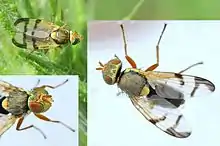Urophora affinis
Urophora affinis is a species of tephritid or fruit flies in the genus Urophora of the family Tephritidae.[2] It has been released in the United States and Canada as a biocontrol agent to control spotted knapweed. U. affinis became established in Montana in 1973.[3]
| Urophora affinis | |
|---|---|
 | |
| Urophora affinis | |
| Scientific classification | |
| Domain: | Eukaryota |
| Kingdom: | Animalia |
| Phylum: | Arthropoda |
| Class: | Insecta |
| Order: | Diptera |
| Family: | Tephritidae |
| Subfamily: | Tephritinae |
| Tribe: | Myopitini |
| Genus: | Urophora |
| Species: | U. affinis |
| Binomial name | |
| Urophora affinis (Frauenfeld, 1857)[1] | |
| Synonyms | |
| |
Life history
U. affinis is multivoltine and overwinters as a larva in knapweed flower heads. In June, adults oviposit on seed heads. Each female can produce about 120 eggs.[4] It has been shown to reduce seed production in knapweed (spotted and diffuse) by up to 95% [5] but that is insufficient for effective management of either species.[5][6] Overwintering Urophora larvae are heavily preyed upon by deer mice Peromyscus maniculatus.[7] The inability of Urophora species to control knapweed led to the introduction of other biocontrol agents, including the weevils Larinus minutus and Bangasternus fausti, which also attack seed heads of knanpweed. In cage experiments, larvae of Larinus minutus and Bangasternus fausti have been shown to consume the developing U. affinis.[8] Reproduction of U. affinis was reduced by L. minutus.[8]
Distribution
France & Germany East to Ukraine & southwest Russia, Italy, Balkans, Turkey & Iran; introduced to North America
References
- Frauenfeld, G.R. von (1857). "Beiträge zur Naturgeschichte der Trypeten nebst Beschreibung einiger neuer Arten". Sitzungsberichte der Akademie der Wissenschaften in Wien. 22: 523–557, 1 pl. Retrieved 14 February 2021.
- Norrbom, A.L.; Carroll, L.E.; Thompson, F.C.; White, I.M; Freidberg, A. (1999). "Systematic Database of Names. Pp. 65-252. In Thompson, F. C. (ed.), Fruit Fly Expert Identification System and Systematic Information Database". Myia. 9: vii + 524.
- Story JM. 1995a. Spotted knapweed. In: Nechols JR, Andres LA, Beardsley JW, Goeden RD, Jackson CG, editors. Biological Control in the Western United States: Accomplishments and benefits of Regional Research Project W-84, 1964-1989 University of California, Division of Agriculture and Natural Resources, Oakland. Publication 3361. pp 258-263
- Zwolfer H. 1970. Investigations on the host-specificity of Urophora affinis Frfld. (Diptera, Trypetidae). Progress Report, Commonwealth Institute of Biological Control. No. 25.
- Harris P. 1980. Effects of Urophora affinis Frfld, and U. quadrifasciata (Meig.) (Diptera: Tephritidae) on Centaurea diffusa Lam. and C. maculosa Lam. (Compositae). Zeitschrift fur Angewandte Entomologie 90:190-201.
- Powell RD. (1990) The functional forms of density-dependent birth and death rates in diffuse knapweed (Centaurea diffusa) explain why it has not been controlled by Urophora affinis, U. quadrifasciata and Sphenoptera jugoslavica. In: Delfosse ES, editor. Proceedings VII International Symposium on Biological Control of Weeds 6–11 March 1988, Rome, Italy. Instituto Sperimentale per la Patologia Vegetale (MAF). pp 195-202.
- Dean E. Pearson; Kevin S. McKelvey; Leonard F. Ruggiero (2000). "Non-target effects of an introduced biological control agent on deer mouse ecology" (PDF). Oecologia 122:121–128.
- L. Smith & M. Mayer (August 2005). "Field cage assessment of interference among insects attacking seed heads of spotted and diffuse knapweed" (PDF). Biocontrol Science and Technology. Archived from the original (PDF) on 2011-07-21. Retrieved 2010-01-08.